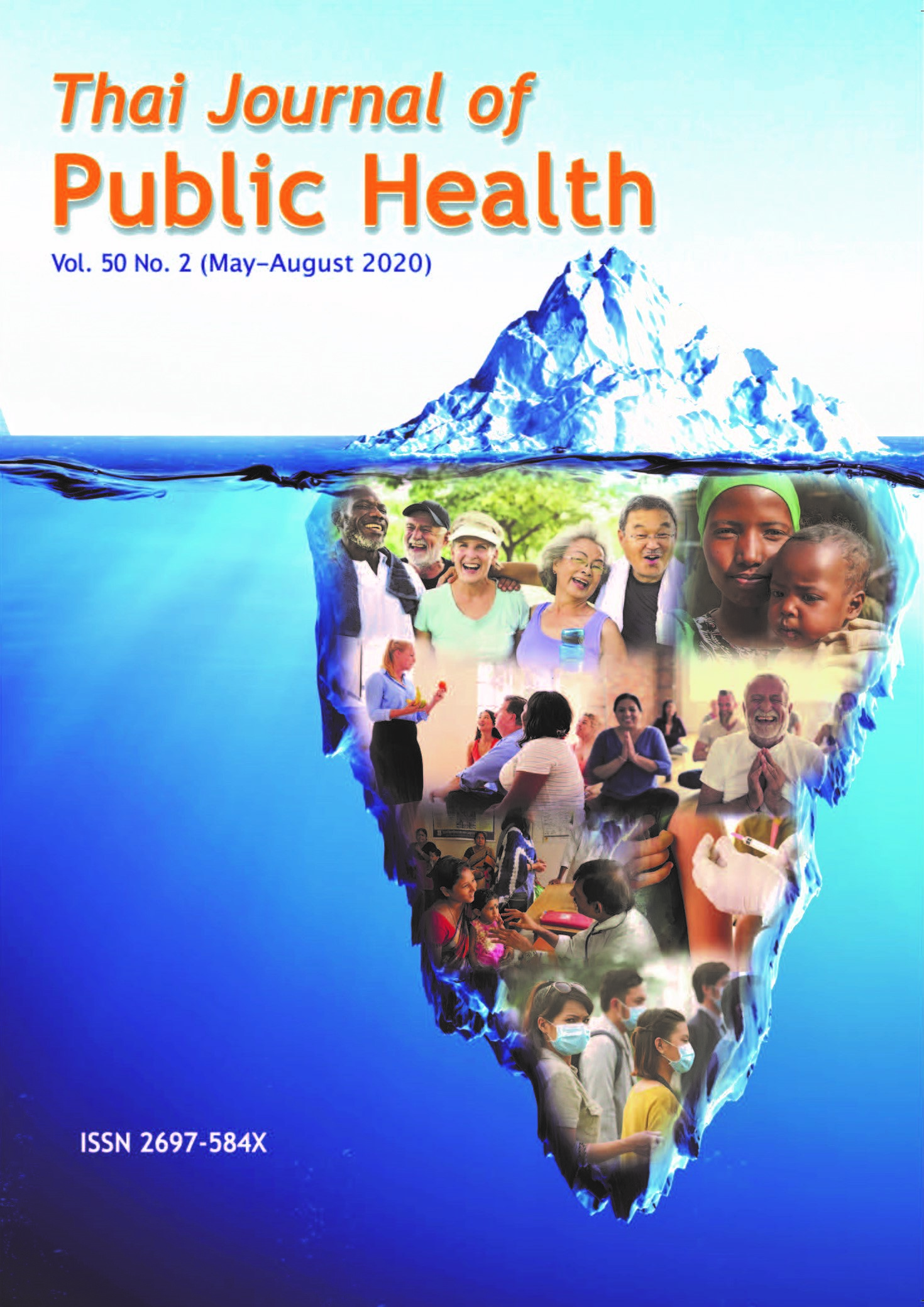Effects of Nutrition Literacy Promotion Program on Eating Behavior of Secondary School Students
Keywords:
nutrition literacy promotion program, nutrition literacy, eating behavior, grade 7 studentsAbstract
Poor eating behavior is a risk factor for the development of non-communicable diseases. Adolescence is a crucial stage between childhood and adulthood where an individual develops new behavior and practices, including dietary habits, under the influence of family, friends and knowledge of nutrition. Early improvement of literacy in nutrition may lead to healthy lifelong eating habit. This quasi-experimental study was aimed at assessing the effects of a nutrition literacy promotion program on the nutrition literacy and eating behavior of secondary school students in the Province of Samut Prakan. Experimental and comparison groups consisted of samples of 33 grade 7 students from each of 2 coeducational secondary schools in the study area. The nutritional literacy promotion program was provided to the experimental group for 4 weeks. The nutrition literacy’s program consisted of accessing, understanding, and analyzing nutritional information and dietary decisions based on methods of active learning including lectures, game playing, question and answer sessions, and brainstorming. The comparison group received the nutrition education program from the regular school health curriculum. Self-administered questionnaires on nutrition literacy and eating behavior were collected at baseline and 4 weeks after the start of the intervention. Weight and height were performed for anthropometric measurements. Paired t-test, independent 2 simple t-tests, Pearson correlation, and multiple linear regression were used at a 5% significance level. The results showed that improvements in overall nutrition literacy and eating behavior among the experimental group were significantly higher than for the comparison group (p<0.001 and 0.001, respectively). However, after controlling for students’ sex, grade-point average, daily allowance, place of residence and source of family foods, the experimental group had a significantly higher change of nutrition literacy and eating behavior, following the intervention, than did the comparison group (p<0.001 and 0.003, respectively). An increase is noted in nutrition literacy from baseline to the post-intervention period, and that improvement was significantly reflected in a better eating behavior. To promote nutrition literacy and eating behavior among secondary school students, a program of nutrition literacy should be included into the regular school health curriculum.
References
World Health Organization. Obesity and Overweight. Available from: http://www.who.int/en/news-
room/fact-sheets/detail/obesity-and-overweight, accessed September 4, 2018.
Aekplakorn W. The 5th Thai population health examination survey by the physical examination. Nonthaburi: Font Graphic and Design; 2016. (In Thai)
Samut Prakan Provincial Health Office. The 2017 annual report. Samut Prakan: Samut Prakan Provincial Health Office; 2017. (In Thai)
Enes CC, Slater B. Obesity in adolescence and its main determinants. Rev Bras Epidemiol 2010;13(1):163-71.
Ministry of Digital Economy and Society. The 2017 food consumption behavior survey. Bangkok: National Statistical Office; 2018. (In Thai)
Department of Health. The 2017 annual report of Department of Health. Bangkok: Font Graphic and Design; 2018. (In Thai)
Carbone ET, Gibbs HD. Measuring nutrition literacy: Problems and potential solutions. J Nutr Disorders Ther 2013;3(1).
Joulaei H, Keshani P, Kaveh M. Nutrition literacy as a determinant for diet quality amongst young adolescents: A cross sectional study. Progress in Nutrition 2018;20(3):455-64.
Silk KJ, Sherry J, Winn B, Keesecker N, Horodynski MA, Sayir A. Increasing nutrition literacy: testing the effectiveness of print, website, and game modalities. J Nutr Educ Behav 2008;40(1):3-10.
Kaewkla C, Chamcham W, Kaeodumkoeng K. Factors related to nutrition literacy of secondary school students in Ratchaburi province. Journal of the Health Education Professional Association 2018;33(2):15-23. (In Thai)
Ministry of Education. Indicators and core content learning, health and physical education subject according to 2008 of the core curriculum of basic education. Bangkok: Bureau of Academic Affairs and Educational Standards; 2009. (In Thai)
Jaiboon O. Promoting nutrition label health literacy among secondary school students [M.Sc. Thesis in Health education and behavioral science]. Bangkok: Faculty of Public Health, Mahidol University; 2015. (In Thai)
Lorenzen M. Active learning and library instruction. Illinois Libraries, Spr 2001;83 (2):19-24.
Chirawatkul A. Statistics for health science research. 4th ed. Bangkok: S. Asia Press; 2016. (In Thai)
Yaemmen P, Duangsong R. The effects of a health promotion program by application of the health belief model and social support on behavioral modification for weight control among overweight students at level 5 of primary school, Muang District, Phitsanulok Province. KKU Res J 2012;12(1):57-67. (In Thai)
Bureau of Nutrition. Guidelines for monitoring the growth of children aged 6-18 years. Nonthaburi: Department of Health; 2009. (In Thai)
Foundation for Thai Education Development. Guidelines for improving health literacy of the youth and families with the power of the education network. Bangkok: The Secretariat of the Council of Education; 2010. (In Thai)
Stark A, Stekler M. Nutrition Education Works: Increasing nutrition literacy and promoting healthy eating in Israeli adolescents (Oral abstract). J Nutr Educ Behav 2016;48(7 Suppl): S2.
Jiemngern D. Effectiveness of a health education program for nutrition literacy development on a food-based dietary guideline and nutrition flag for secondary school students [MSc.Thesis in Health Education]. Bangkok: Faculty of Education, Kasetsart University; 2012. (In Thai)
Gubbels JS. Environmental influences on dietary intake of children and adolescents. Nutrients 2020;12(4):922.
Downloads
Published
Issue
Section
License
Creative Commons License CC-BY-ND


